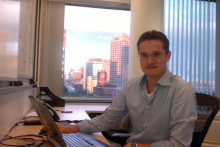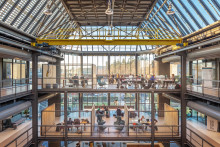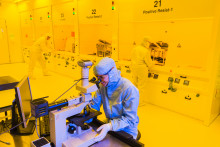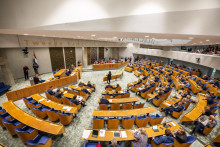Erwin Hofman is assistant professor in new product development and new service development in the department business administration. Conference connections invited him to two prestigious business schools. Hofman: ‘I worked at NYU SternSchool of Business in New York for three months with Melissa Schilling, and am currently situated at NortheasternUniversity in Boston. I was invited here by Gloria Barzcak. She is the editor of Journal of Product Innovation Management, and a true expert in new product development.’

The Dutch assistant professor knew from the beginning that the trip would not be pleasure only. He is working hard. ‘I am here to research collaborative innovation networks and to establish new projects. It is going well, but I really had to get used to the American pace of living. Long hours do not leave much time for things as cooking or ironing shirts. I outsourced those things rather quickly’, Hofman jokes.
Construction industry and gaming
One of the projects that Hofman got to work on concerns platform strategies in gaming. Erwin: ‘In my own previous research, I largely focused on open innovation in the construction industry. Many coalitions and parties are involved there, and most activities are project-based. These aspects also play a role in gaming. There, the struggle is to find the right network partners to develop truly novel games and to decide on when to launch new games in a certain platform. Should it be at an earlier or later phase in the life cycle of the platform, and who should be involved when?’ Hofman explains that he is collecting data on this issue. ‘The dataset contains information on the parties that were involved in the development of various games, and the role that teams played in the process. I would like to publish on that.’
Case-based learning
Next to new publishing material, Hofman took the opportunity to follow classes. ‘In the USA, teaching is far more practice-oriented than what we are used to. The focus lies on practical tools and the discussion of many cases. It is a nice way of learning. I can take some syllabi home, perhaps we can use them in TOM.’
Weirdest thing
During his stay in Boston, Hofman experienced something hilarious. ‘I was on the tram, and heard some people speaking Dutch. That’s a rarity, so I approached them for some small talk. You can imagine my utter astonishment when one of them said: ‘Hey, you are Erwin Hofman, you were my professor at the University of Twente!’’. Coincidental as that may be, the best part was yet to come. Hofman: ‘It appeared that this guy, Tinco Alderinga, had developed a product and was in the USA to meet with potential customers. Indeed, he had a 9 in my course Management of Innovation. I don’t know what else could give a professor more satisfaction’, he laughs.
More peer reviewing at and beyond UT
Hofman is highly impressed by the peer review culture that seems to exist in the USA: ‘I regularly attend research seminars here. It is common to invite colleagues from other universities, too. The public is challenged to think about the topic and gives useful feedback. The aim is always to get work published in top journals.’ According to Hofman, the UT could learn from this. ‘On the one hand, Americans are hugely competitive and doors are literally locked. But when it comes to peer reviewing, they are very open and take a lot of time to help. The concept is very simple; you just invite people. We could do with a little more interaction.’







